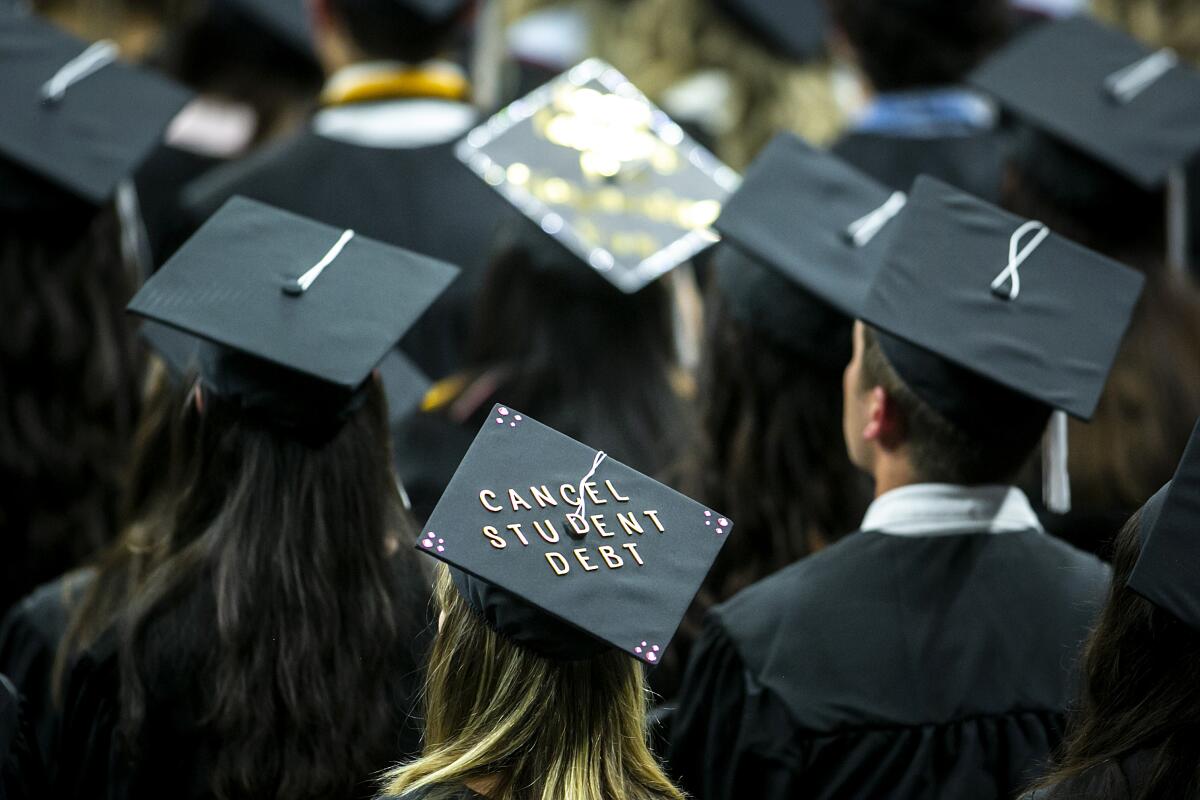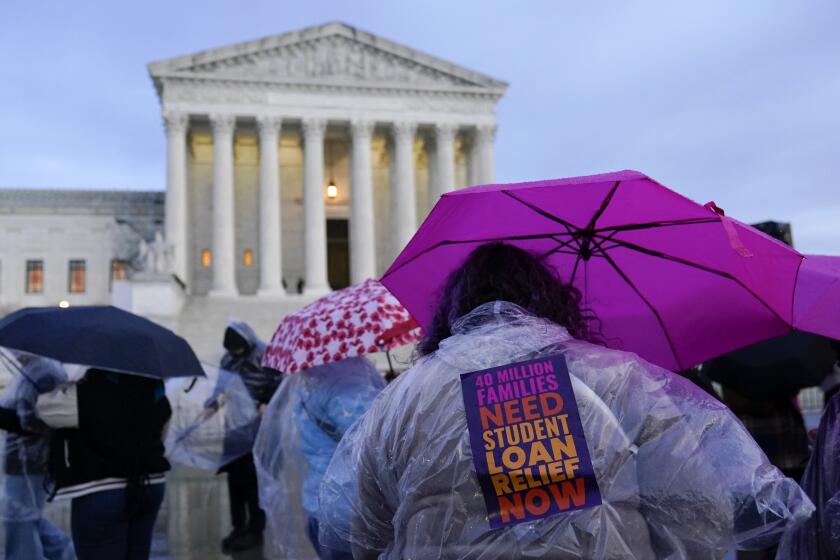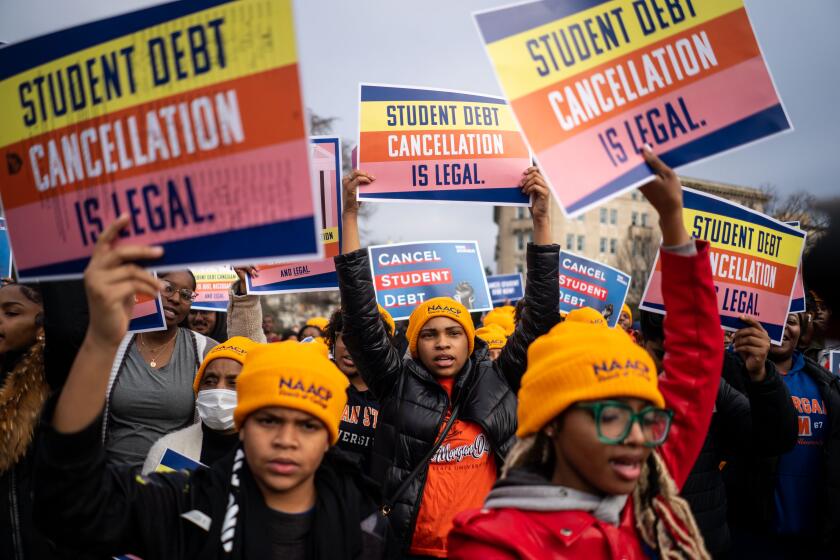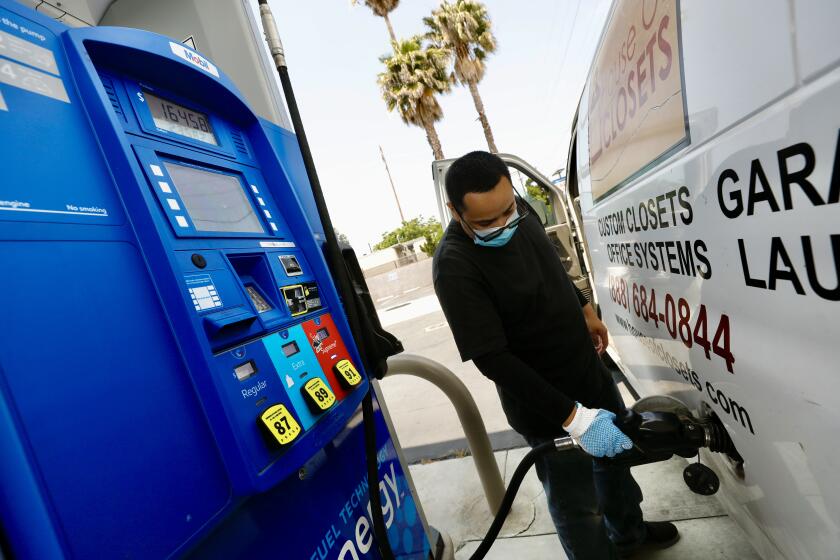Recession fears persist. Here’s how new grads can prepare

- Share via
In 2023 alone, there have been more than 118,000 U.S. tech layoffs, according to Crunchbase News, a business publication. That’s in addition to two major bank collapses and two federal rate hikes. The class of 2023 will graduate into this economic upheaval while facing another variable: student loan payments.
This can be an overwhelming and confusing time for those set to begin repayment of student debt, said Barry Coleman, vice president of program management and education at the National Foundation for Credit Counseling. Coleman cites the expected end of a three-year pause on federal student loan payments, legal challenges to federal student debt relief programs and the potential effect of inflation on the job market as reasons new graduates could feel uneasy.
But new grads don’t need to panic. Here’s how they can weather a potential recession and the financial uncertainty that might come with it.
HAVE A PLAN, NO MATTER THE ECONOMY
Understanding your student debt is one of the best strategies to stay on top of your loans, regardless of how the economy is performing, said Betsy Mayotte, founder of the Institute of Student Loan Advisors.
There is typically a six-month grace period after graduation before you’re required to make your first student loan payment. Before this first payment is due, gather details such as the types of loans you have and who holds them, Mayotte said.
Then, know your expected income, your expenses and how your student loan payments will fit into your budget, Coleman said. This will limit any surprises once repayment begins.
As the amount of student loan debt continues to grow, more and more borrowers are seeking alternative ways to get relief. But many companies promising to help are just trying to exploit borrowers’ desperation.
IF YOU HAVE A JOB, PAY OFF STUDENT DEBT FASTER
If you land a job, you have more flexibility. A steady income gives you the opportunity to explore putting more money toward your student loan debt — if you’re already contributing to your retirement and emergency savings.
For borrowers who have the capacity to make more than the minimum payment on their student loan, this is the chance to get rid of student debt as quickly as possible, while saving as much money as they can on interest, Coleman said.
And don’t overlook your employer.
Twenty-one percent of employers offer company-paid financial services as part of their benefits package, said Jim Link, chief human resources officer for the Society for Human Resource Management. Programs can include access to financial advisors at no cost to the employee or even student loan repayment programs — both of which could offer additional protection in a slow economy.
Biden’s plan to forgive up to $20,000 in student loans is held up in the courts. But the administration has already canceled billions in debt.
IF YOU DON’T HAVE A JOB, KNOW YOUR OPTIONS
Graduating without a job offer can be terrifying, especially if the economy is expecting a downturn. But with low or no income, you can still take steps to stay on top of your student debt, even in a recession.
Start with your loan servicer, the company that manages your loans. Let it know as early as possible that you’re not employed, Coleman said. Ask what your options are to avoid delinquency, which is missing a student loan payment.
There are many repayment options for federal student loan borrowers, Mayotte said. You can lower your payments — even to zero dollars — with an income-driven repayment plan, or temporarily stop payments through student loan deferment.
Just note that interest can still accrue while in deferment, and this increases your total student loan balance. Once you land a job and you’re in a position to repay your student loan, do so as soon as possible so you’re not facing a significantly larger debt down the road, Coleman said.
Mixed signals — including layoffs, strong job growth and lingering inflation — have clouded the U.S. economic outlook.
And while conducting your job search, it may be worth considering a career with a nonprofit organization or government entity if you have federal student loans. These positions could qualify you for Public Service Loan Forgiveness — under which your remaining student loan balance is forgiven after 10 years of qualifying payments.
GET FREE HELP MANAGING YOUR DEBT
Even in a slow economy, you can get student loan help from organizations that won’t charge anything, such as the Institute of Student Loan Advisors and the Student Borrower Protection Center.
Whether you’re exploring how to pay off your loans faster or how to afford the monthly payments, nonprofit organizations such as those findable through the National Foundation for Credit Counseling can connect you with counselors and help you create an action plan, Coleman said.
However the economy unfolds, new grads can create a strong plan for their student loans that will serve them both in tough and robust economic times.
Branch writes for personal finance site NerdWallet. This article was distributed by the Associated Press.
More to Read
Inside the business of entertainment
The Wide Shot brings you news, analysis and insights on everything from streaming wars to production — and what it all means for the future.
You may occasionally receive promotional content from the Los Angeles Times.













